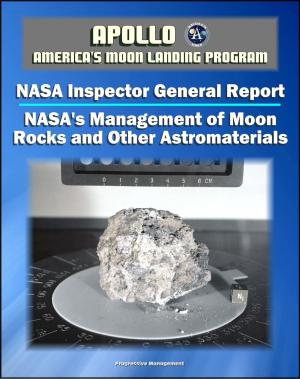Energy Development and Permitting in Alaska: Managing for the Future in a Rapidly Changing Arctic - Oil and Gas, Mining, Shipping and Fisheries, Global Warming and Climate Change
Nonfiction, History, Polar Regions, Science & Nature, Technology, Power Resources| Author: | Progressive Management | ISBN: | 9781311565242 |
| Publisher: | Progressive Management | Publication: | November 28, 2014 |
| Imprint: | Smashwords Edition | Language: | English |
| Author: | Progressive Management |
| ISBN: | 9781311565242 |
| Publisher: | Progressive Management |
| Publication: | November 28, 2014 |
| Imprint: | Smashwords Edition |
| Language: | English |
The United States is an Arctic nation, one of only eight such nations worldwide that are responsible for the stewardship of a region undergoing dramatic environmental, social, and economic changes. The implications of these changes demand a fresh look at how the Federal Government and its partners address management challenges in the region. In consultation with the National Ocean Council, the National Security Staff, and the Arctic Research Commission, the Interagency Working Group on Coordination of Domestic Energy Development and Permitting in Alaska (Alaska Interagency Working Group) initiated this report to describe these challenges as they relate to the management of natural resources in the U.S. Arctic. The report presents recommendations for advancing a common management approach that provides coordinated, forward-thinking solutions.
This report, which focuses on the portions of the Arctic that are within U.S. jurisdiction, seeks to build upon those efforts by exploring common management approaches to address this rapidly changing region. To lay a foundation for that discussion, Chapter 2 describes observed and predicted trends for the ecosystems, economies, and communities of the U.S. Arctic, with additional information on anticipated infrastructural needs in this transforming region. Chapter 3 explores and summarizes the goals and visions of the region's many stakeholders as expressed during the preparation of this report. Chapter 4 summarizes the challenges faced in managing competing objectives in a changing environment and provides guidance and principles for navigating those challenges. Chapter 4 closes by suggesting several steps that might be taken to develop a common management approach—which this report terms "Integrated Arctic Management"—that holds the promise of a broader-based and more consistent integration of development and conservation strategies, taking into account the values and interests of all key stakeholders in the Arctic.
Chapter 1: Introduction * 1.1. Background of this report * 1.2. Geographic scope * Chapter 2: Our changing Arctic * 2.1. Environmental trends * Climate * Marine ecosystems * Terrestrial and freshwater ecosystems * 2.2. Cultural and social trends * Subsistence way of life * Historic and archeological resources * 2.3. Economic trends * Oil and gas * Renewable energy * Mining * Commercial shipping * Commercial fisheries * Tourism * 2.4. Infrastructure trends * Oil and gas * Roads * Marine shipping and support * Aviation infrastructure and services * Weather and sea ice forecasts * Space weather forecasts * Mapping * Coastal erosion and rural communities * Emergency preparedness and response * Arctic access * Communications * Chapter 3: Visions and goals for the U.S. Arctic * 3.1. Industrial and commercial stakeholders * Oil and gas * Renewable energy * Mining * Shipping * Commercial fisheries * Tourism * 3.2. State of Alaska * 3.3. Tribal governments and Alaska Native Organizations * Subsistence way of life * Tribal consultation * Traditional knowledge * Ecosystem-based management * Economic development * Environmental protection * 3.4. Municipal governments * Economic development * Emergency preparedness and response * Shipping * Food security * Community infrastructure * Partnerships * Scientific research * 3.5. Conservation organizations * 3.6. Federal Government * Science-based decision-making * Develop natural resources in an environmentally and culturally sensitive manner * Support development of adequate infrastructure * Improve communications * 3.7. Comparing future visions and goals * Chapter 4: Toward an integrated, science-based approach to Arctic management * 4.1. Institutional challenges * 4.2. Promising approaches * Local and regional efforts * Federal efforts * International efforts * 4.3. Integrating Arctic management * 4.4. Recommendations
The United States is an Arctic nation, one of only eight such nations worldwide that are responsible for the stewardship of a region undergoing dramatic environmental, social, and economic changes. The implications of these changes demand a fresh look at how the Federal Government and its partners address management challenges in the region. In consultation with the National Ocean Council, the National Security Staff, and the Arctic Research Commission, the Interagency Working Group on Coordination of Domestic Energy Development and Permitting in Alaska (Alaska Interagency Working Group) initiated this report to describe these challenges as they relate to the management of natural resources in the U.S. Arctic. The report presents recommendations for advancing a common management approach that provides coordinated, forward-thinking solutions.
This report, which focuses on the portions of the Arctic that are within U.S. jurisdiction, seeks to build upon those efforts by exploring common management approaches to address this rapidly changing region. To lay a foundation for that discussion, Chapter 2 describes observed and predicted trends for the ecosystems, economies, and communities of the U.S. Arctic, with additional information on anticipated infrastructural needs in this transforming region. Chapter 3 explores and summarizes the goals and visions of the region's many stakeholders as expressed during the preparation of this report. Chapter 4 summarizes the challenges faced in managing competing objectives in a changing environment and provides guidance and principles for navigating those challenges. Chapter 4 closes by suggesting several steps that might be taken to develop a common management approach—which this report terms "Integrated Arctic Management"—that holds the promise of a broader-based and more consistent integration of development and conservation strategies, taking into account the values and interests of all key stakeholders in the Arctic.
Chapter 1: Introduction * 1.1. Background of this report * 1.2. Geographic scope * Chapter 2: Our changing Arctic * 2.1. Environmental trends * Climate * Marine ecosystems * Terrestrial and freshwater ecosystems * 2.2. Cultural and social trends * Subsistence way of life * Historic and archeological resources * 2.3. Economic trends * Oil and gas * Renewable energy * Mining * Commercial shipping * Commercial fisheries * Tourism * 2.4. Infrastructure trends * Oil and gas * Roads * Marine shipping and support * Aviation infrastructure and services * Weather and sea ice forecasts * Space weather forecasts * Mapping * Coastal erosion and rural communities * Emergency preparedness and response * Arctic access * Communications * Chapter 3: Visions and goals for the U.S. Arctic * 3.1. Industrial and commercial stakeholders * Oil and gas * Renewable energy * Mining * Shipping * Commercial fisheries * Tourism * 3.2. State of Alaska * 3.3. Tribal governments and Alaska Native Organizations * Subsistence way of life * Tribal consultation * Traditional knowledge * Ecosystem-based management * Economic development * Environmental protection * 3.4. Municipal governments * Economic development * Emergency preparedness and response * Shipping * Food security * Community infrastructure * Partnerships * Scientific research * 3.5. Conservation organizations * 3.6. Federal Government * Science-based decision-making * Develop natural resources in an environmentally and culturally sensitive manner * Support development of adequate infrastructure * Improve communications * 3.7. Comparing future visions and goals * Chapter 4: Toward an integrated, science-based approach to Arctic management * 4.1. Institutional challenges * 4.2. Promising approaches * Local and regional efforts * Federal efforts * International efforts * 4.3. Integrating Arctic management * 4.4. Recommendations















